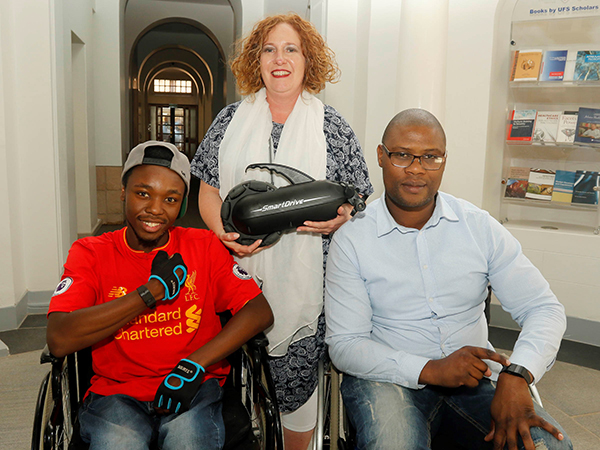Latest News Archive
Please select Category, Year, and then Month to display items
12 December 2024
|
Story Lacea Loader
|
Photo Supplied
 Dr Cias Tsotetsi, newly appointed Campus Vice-Principal: Academic and Research on the UFS Qwaqwa Campus.
Dr Cias Tsotetsi, newly appointed Campus Vice-Principal: Academic and Research on the UFS Qwaqwa Campus.
The University of the Free State (UFS) is pleased to announce the appointment of Dr Cias Tsotetsi as the Campus Vice-Principal: Academic and Research on the UFS Qwaqwa Campus as from 1 January 2025.
He is currently Senior Lecturer and Assistant Dean in the Faculty of Education on the UFS Qwaqwa Campus. He holds the following qualifications: BEd(Hons), Postgraduate Diploma in Education, Magister Educationis with specialisation in Policy Studies and Governance in Education, and PhD with specialisation in Philosophy and Policy Studies in Education – all from the UFS.
Dr Tsotetsi operated in the school environment for about 24 years before joining this university in 2010. Since then, he has taught several modules in the Faculty of Education and published several co-authored research articles as well as conference papers on community engagement, teacher development, and participatory action research methodologies, among others. He is also well versed in supervising postgraduate students.
He has received awards from both the university’s Scholarship of Teaching and Learning and the Research committees for his research and academic scholastic performance. He is a member of various committees, such as the Faculty of Education Academic Advisory Board and the Committee for Title Registration and has been participating in partnerships and in NRF-funded projects with peers from universities such as the University of KwaZulu-Natal, the University of Zululand, the Durban University of Technology, and the University of Venda.
“Dr Tsotetsi has a clear understanding of the current systems and operations on the Qwaqwa Campus and is positioned to drive its development. His experience and initiatives involving staff and postgraduate students are exceptional and inspiring. We look forward to Dr Tsotetsi’s valuable contribution to the UFS Qwaqwa Campus and the institution in his new position,” says Prof Prince Ngobeni, Campus Principal of the Qwaqwa Campus.
“I feel honoured to serve the university – and the Qwaqwa Campus in particular – and look forward to working with the campus and its management to develop the research portfolio,” says Dr Tsotetsi.
SmartDrive devices give UFS wheelchair users more independence
2017-12-01

From the left, are: David Mashape; Martie Miranda, Head of the
Center for Universal Access and Disability Support at the UFS;
and Lawrence Qamba, celebrating the recent acquisition
of two SmartDrive Power Assist devices.
Photo: Johan Roux
Students who make use of wheelchairs at the University of the Free State (UFS) will now be able to move around campus more independently than before. This is thanks to two SmartDrive Power Assist devices acquired by the university.
Accessibility is very important to the institution and with these devices clipping onto a manual wheelchair to make it motorised, students will not have to ask for help that often. It will assist them in overcoming obstacles they face every day.
Different surfaces pose different challenges
According to Martie Miranda, Head of the Center for Universal Access and Disability Support (CUADS), one of the most important advantages of the SmartDrive machines is that it enhances the independence of students. The devices were bought with funds received from the Department of Higher Education and Training specifically allocated for accessibility and infrastructure.
“While the UFS is addressing inaccessibility on its campuses, which will take time, this will help to motorise wheelchairs for wheelchair users to move around more easily. Students can now move around independently without necessarily asking for help, for example, to get up very steep ramps.” Miranda says some surfaces, such as grass and gravel, has its own unique challenges for wheelchair users.
A few years coming
The SmartDrive devices are operated by a Bluetooth watch. By tapping twice on the chair or clapping twice, the motor propels the wheelchair forward and stops when tapped twice, while also braking with one’s hands. The speed can also be controlled by the user. The machines use rechargeable batteries, with a fully charged battery lasting up to 15 hours.
Acquiring the devices was a process of a few years, and CUADS is happy to finally employ them to the benefit of their students. Miranda says the determination and support of Prof Nicky Morgan, Vice-Rector: Operations, and the assistance of Nico Janse van Rensburg, Senior Director: Top Management, were instrumental in buying the devices.